Australian wildfires raze homes in New South Wales
- Published
Blue Mountains resident: "I knew my house was gone"
Australian fire fighters are battling a series of major wildfires in New South Wales, with fears that hundreds of homes have been destroyed.
The blazes are continuing to burn on the outskirts of Sydney, despite the easing of temperatures and winds.
One man has died while trying to protect his home.
Prime Minister Tony Abbott visited Winmalee in the Blue Mountains, one of the areas worst-hit by the fires, around 70km (45 miles) west of Sydney.
Correspondents say bushfires are common in Australia but they have come earlier than normal this year, sparking concerns of further problems to come.
Minister for Police and Emergency Services Michael Gallacher told the BBC that "the speed and the ferocity" of the fires was something "not seen for many, many years".
"We had one fire front that changed direction and had a front to it, so if you can imagine, burning in one direction 25km [15 miles] wide."
"We're only now in the process of being able to return to some of the sites to check the magnitude of the losses and I've got to say, it's going to be quite substantial," he added.
Hundreds of residents spent Thursday night in evacuation centres, with many returning home to find their houses razed.
Fire fighters described blazes as tall as 20m to 30m (100ft).
A 63-year-old man died from a heart attack as he tried to defend his home in Lake Munmorah, in the Central Coast region of NSW, on Thursday afternoon.
Around 2,000 fire fighters across the state worked to try and contain the fires but many are still burning out of control, says the BBC's Jon Donnison.
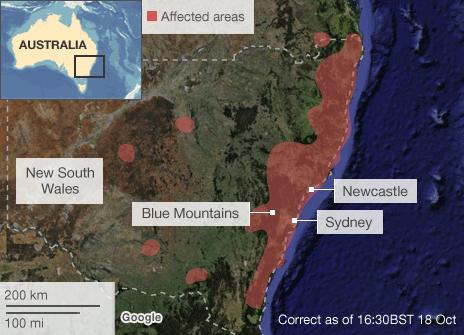
Mr Abbott, in Winmalee, said of those helping to battle the fires: "These are ordinary people who, on an extraordinary day, come together to support their community and to protect their fellow Australians."
At least three fire fighters have been reported injured.
The NSW Rural Fire Service said an initial assessment of the Winmalee and Springwood areas showed that 81 properties had been destroyed, with 37 damaged.
Fire chief Shane Fitzsimmons breaks down as he describes the battle being fought against the bushfires- footage courtesy Australian Broadcasting Corporation
"Approximately 30% of the fireground has been assessed," it said, external. "The number of properties destroyed or damaged will rise."
Reports estimate that as many as 200 homes could be lost in total.
The fires have been caused by unseasonably hot temperatures and strong winds. While these have now died down, more hot weather is forecast next week.
"It's been an awful 24 hours for the Blue Mountains [region]," Mayor Mark Greenhill told Nine Network Television. "We've lost possibly scores of homes."
Ron Fuller, who lost his home in Winmalee, told ABC News, external: "We've had a number of fires through here before but this was an extraordinary fire. The speed was extraordinary, it just raced through this whole area, took out some houses, left other ones standing."
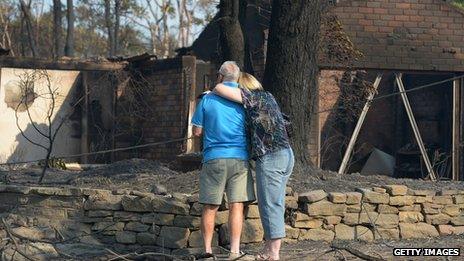
Residents faced scenes of devastation in Sydney's Blue Mountains
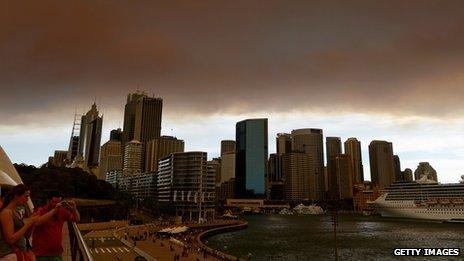
Plumes of orange smoke hung over Sydney
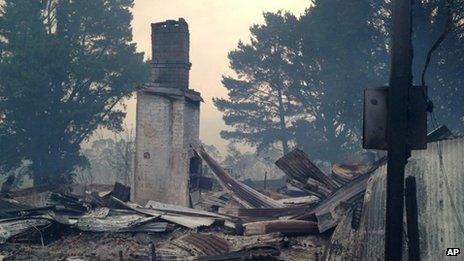
Some buildings were destroyed beyond recognition
Jodie Harrison, Mayor of Lake Macquarie, said that four heritage homes, as well as a historic jetty, were caught in the fire.
"It's been confirmed that four houses in the heritage village of Catherine Hill Bay have been lost," she told local media.
Darkened skyline
NSW Premier Barry O'Farrell, in an interview on broadcaster 7 News, external, called the fires "some of the worst we have experienced around Sydney in living memory".
"We're in for a long, tough summer," he added.
Alex Chesser, a District Officer with the New South Wales Rural Fire Service, told the BBC that the fires had come unusually early.
"It's... a combination of a couple years of quite wet summers and winters which have allowed the bush to continue to grow at high rates, and also prevented us undertaking as many hazard reduction burns as we'd like," he said.
Smoke and ash from the wildfires blanketed the Sydney skyline on Thursday.
New South Wales was also hit by bush fires in September, which injured several fire fighters.
Satellite image of fires around Sydney
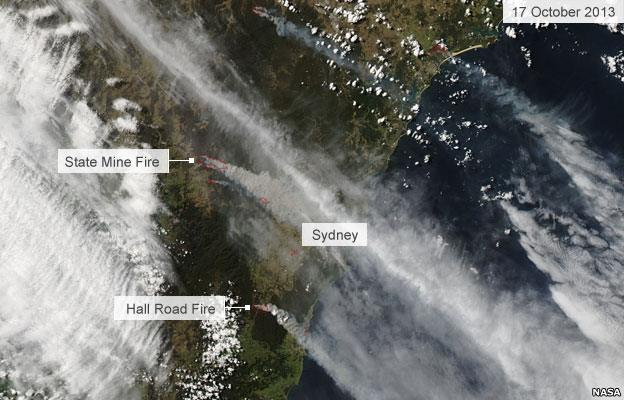
- Published18 October 2013
- Published17 October 2013
- Published8 January 2013
- Published9 January 2013
- Published12 January 2013